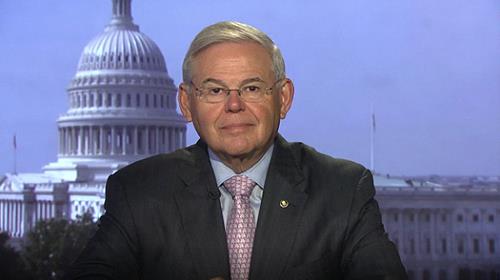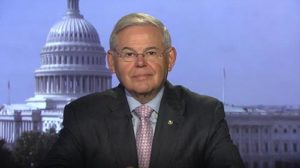

June 7, 2017— U.S. Senator Bob Menendez (D-N.J.), senior member of the Senate Foreign Relations Committee, spoke on the Senate floor today about the need to hold Iran accountable as the full Senate prepares to take up the Countering Iran’s Destabilizing Activities Act of 2017 (S.722), bipartisan legislation written by Senator Menendez and his colleagues.
“We must not lose sight of Iran’s ongoing, ever-growing efforts to exert more control, more power, and more influence throughout the Middle East,” said Sen. Menendez. “With the regime’s tentacles reaching across the region – from its support of a Shia proxy network in Iraq, to its growing influence in Afghanistan, to its continued sponsorship of terrorist groups like Hezbollah and Hamas, we need a strategic approach that engages our partners in the region and recognizes their capacity to counter Iran’s behavior. That is exactly what the Countering Iran’s Destabilizing Activities Act does.”
The Countering Iran’s Destabilizing Activities Act of 2017 was introduced on March 23rd, and contains the following key provisions:
• New Mandatory Ballistic Missile Sanctions: Imposes mandatory sanctions on persons involved with Iran’s ballistic missile program and those that transact with them.
• New Terrorism Sanctions: Applies terrorism sanctions to the Islamic Revolutionary Guard Corps (IRGC) and codifies individuals who are currently sanctioned due to Iranian support for terrorism.
• Enforcement of Arms Embargo: Requires the president to block the property of any person or entity involved in specific activities related to the supply, sale, or transfer of prohibited arms and related material to or from Iran.
The Senator’s full remarks as prepared for delivery:
Mr. President, I rise today in strong support of the Countering Iran’s Destabilizing Activities Act of 2017.
But first, I would like to offer my strongest condemnation of the terrorist attack allegedly carried out by ISIS this morning in Tehran, which claimed the lives of 12 people.
Attacks on civilians in any corner of the world must be strongly condemned by the United States. And I offer my condolences to the people of Iran and the families who lost loved ones in this latest act of terror.
If anything, these events remind us that the entire Middle East is increasingly under siege, and the United States and the entire international community must unite to confront terrorism and extremism in all its forms.
And that means holding governments who continue to foment, fund, and encourage terrorism accountable.
And while the people of Iran suffered a heinous attack today, the unfortunate reality is that the violence, volatility, and profound human suffering that imperils the Middle East is all too often linked back to the government of Iran.
Across the region, this regime continues to pursue policies that threaten the national security interests of the United States….
It continues to support terrorism, and exert influence through the growing power of proxy actors throughout the Levant and Yemen…
And even as it continues to supply terrorists across the region with money, weapons, and resources, the people of Iran continue to suffer under a repressive regime with absolutely no respect for the basic human rights.
We all know that the United States faces a multitude of threats at home and abroad…
From Russia’s cyberattack on our election… To North Korea’s continued belligerence… To new questions about America’s leadership in the world.
But even as Congress rightly remains focused on these challenges, we must not lose sight of Iran’s ongoing, ever-growing efforts to exert more control, more power, and more influence throughout the Middle East.
Whether we are talking about an adversary like Russia or Iran or an international challenge like climate change or the refugee crisis…
We cannot let issues of such importance to our future be obscured by partisan politics…
Derailed by divisive tweets… Or lost amid the revelations of our relentless 24-hour news cycle.
I’ve always believed that politics must stop at the water’s edge. And I know that many of my colleagues share that principle.
That’s why there’s such broad bipartisan support for the Countering Iran’s Destabilizing Activities Act.
I’m pleased to have worked with Senators Corker, Cardin, and a number of other colleagues on legislation that has earned the support of nearly 60 cosponsors.
We crafted this legislation by listening to an array of different voices with experience addressing Iran’s destabilizing influence.
But let me be clear: This bill is not about Iran’s nuclear program. This bill is not about the Joint Comprehensive Plan of Action.
With the regime’s tentacles reaching across the region – from its support of a Shia proxy network in Iraq… to its growing influence in Afghanistan.
To its continued sponsorship of terrorist groups like Hezbollah and Hamas, we need a strategic approach…
One that engages our partners in the region and recognizes their capacity to counter Iran’s behavior.
That is exactly what the Countering Iran’s Destabilizing Activities Act does.
Our legislation calls on the President of the United States to develop a regional strategy to counter Iran’s asymmetric and conventional threats across the Middle East.
We know that Iran continues to develop sophisticated ballistic missile technologies. They aren’t exactly hiding it.
Just a few weeks ago, a semi-official news service for the Iranian Revolutionary Guard announced it had built a third underground facility dedicated to ballistic missiles.
And Iran continues to test launch missiles – some of which may be capable of reaching Europe or Israel – both critical allies of the United States.
In fact, some of the missiles launched earlier this year had the words “Israel must be wiped off the earth” etched on their sides.
That’s why S.722 requires the President to impose sanctions on any person who knowingly engages and materially contributes in the support of Iran’s ballistic missiles program.
Some argue that imposing new sanctions on Iran violates the “spirit” of the JCPO.
But I would argue that actively building underground ballistic missile facilities does little to promote goodwill in the region.
Beyond its missile program, Iran remains actively engaged in importing and exporting small and conventional arms to terrorist proxies around the world and bad actors like North Korea.
In January of this year, outgoing UN Secretary General Ban Ki Moon expressed concern that Iran might have violated an arms embargo by supplying weapons and missiles to Hezbollah.
Yet not all of Iran’s violations make high profile news. We know that Iran has ramped up it supply of weapons to the Houthi rebels in Yemen and other proxies throughout the region.
That’s why this legislation imposes sanctions on any individual who knowingly engages in activity that materially contributes to the supply, sale, or transfer of arms – as defined and established by UN standards.
And finally, when it comes to human rights, some try to paint a pretty picture of reform in Iran.
But a closer look reveals chilling and deplorable human rights abuses.
According to Human Rights Watch, by October of last year, Iran executed more than 250 people. That’s one person sent to death every day. And many were executed for non-violent drug offenses.
That’s why our legislation expands the scope of violations eligible for sanctions – including those behind the extrajudicial killings of journalists and activists who seek to expose the oppression of the Iranian people.
Finally, this bill calls for a comprehensive report on Americans who suffer at the hands of the Iranian regime…
Including those who have been unjustly detained, and those who have remained missing in Iran for more than a decade…
In short, this bill is a carefully-crafted response to Iran’s ongoing aggression in the Middle East.
But I want to turn to a provision that continues to be misrepresented – and that involves the Iranian Revolutionary Guard Corps.
The IRGC is officially responsible for Iran’s internal security, with a ground force of about 100,000.
But like many other quasi military-political entities in undemocratic countries throughout the world, the IRGC holds enormous influence in Iran’s economy and public affairs.
On paper, the IRGC Quds Force is the lead supporter of Iran’s terrorist networks around the world, and the U.S. has designated it as such…
But the reality is that the IRGC exercises tremendous economic and political power throughout Iran…
It pulls the regime’s levers to fund and support terrorists in the Middle East and beyond.
That’s why our bill specifically calls for terrorism-related sanctions on the IRGC. But it does not, as some have claimed, label the IRGC a Foreign Terrorist Organization.
We heard the concerns of our military and intelligence community.
So let me repeat: this bill does not label the IRGC as a Foreign Terrorist Organization.
What it does do is require the President to acknowledge the role the IRGC plays in supporting terrorism globally.
I know that some of my colleagues have expressed concerns about whether this bill gives a green light to the Administration’s decidedly confrontational approach to Iran.
But that’s precisely why Congress must step up and define our strategy in the Middle East.
As the United States and our partners work to build democratic governance structures… Promote tolerance across the region… And protect civilians and refugees living under siege…
Iran remains aligned with Russia and Syria, actively working to undermine U.S. security interests.
Indeed, Putin, Assad, and the Ayatollah continue to take advantage of the strife that imperils the region…
And meanwhile, the world continues to struggle with extremism, with mass migration, and with the largest human rights crisis since World War II.
With this Administration unable to articulate a clear vision for American leadership in the world…
The time is ripe for Congress to assert its influence in our foreign policy…
To provide guidance and expertise… And to develop a framework for securing our interests in the Middle East.
Now is not the time for Congress to turn a blind eye to Iran’s hostile behavior.
Now is the time for all of us to DEMAND NOTHING LESS than vigorous oversight, constant vigilance, and strict enforcement of our entire arsenal of diplomatic tools, including sanctions and pressure, on Iran.
Thank you.
Source: WWW.menendez.senate.gov, June 7, 2017

